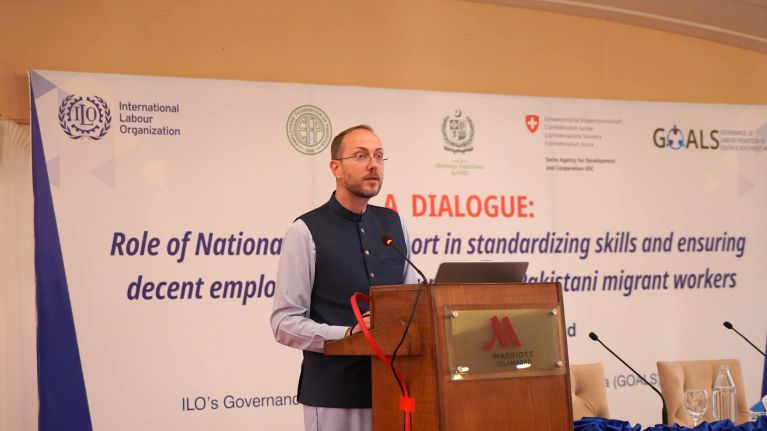
To many Pakistani migrant workers, the National Skills Passport initiative will prove to be a gateway to obtain recognition of their skills and ensure decent employment opportunities for returnee migrant workers, participants at a consultative dialogue concluded today in Islamabad.
The National Skills Passport provides a comprehensive catalogue of an individual’s skills, obtained through formal and informal channels, and provides a migrant worker with documentation of gained qualifications, skills, competencies, and experience in a systematic manner. The National Skills Passport is linked with the Recognition of Prior Learning platform, which formally assesses, certifies, and recognizes the competencies, acquired through informal and unregulated processes.
The consultation event was jointly organized by the International Labour Organization (ILO) and Employers Federation of Pakistan (EFP) in Islamabad in collaboration with the Ministry of Overseas Pakistanis and Human Resources Development (MOP&HRD) and was attended by representatives from Government departments, employers’ and workers’ organizations, and development partners.
The National Skills Passport initiative has been supported by the ILO project Governance of Labour Migration in South and Southeast Asia (GOALS), which is generously supported by the Swiss Agency for Development and Cooperation.
“We are pleased to acknowledge that the Government of Pakistan has taken commendable steps to protect the rights of migrant workers through digital registration, licensing of overseas employment promoters, authentication of foreign employment, grievance redressal mechanisms and welfare programmes for migrant workers and their families,” said Geir Tonstol, ILO Country Director for Pakistan.
“Skilled labour is in increasing demand, including in the countries that received the largest share of Pakistan’s migrant workers. It is important to equip aspiring migrant workers with the right skill sets to meet the demands of the international labour market,” he added.
Speaking at the occasion, Majyd Aziz, former President of the Employers’ Federation of Pakistan stated that the National Skills Passport is not just a card, it is the digital portfolio of an individual to find a decent work opportunity locally and internationally. “We are thankful to the ILO’s technical support for piloting innovative approaches in Pakistan including National Skills Passport and South Asia Regional Qualifications Frameworks,” he added.
“The Government of Pakistan recognizes the increasing demand for skilled human resources in the international labour market and has been focusing on the local and international industry demand-driven skills development programs,” said Jawad Sohrab Malik, Special Advisor to the Prime Minister on Labour and Human Resource Development.
He further emphasized that the government of Pakistan has launched a digital 24/7 complaint cell called 'Call Sarzameen' to promptly address complaints submitted by overseas Pakistanis. He also mentioned 'Naya Pakistan Calling', a platform that facilitates the professional Pakistani diaspora in contributing their knowledge and skills towards national development.


